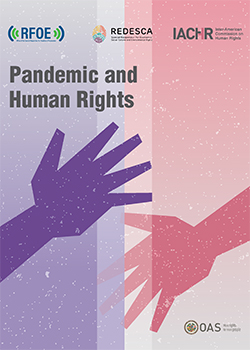
Press Release
IACHR Issues Report on the Pandemic and Human Rights
April 17, 2023
Contact info
IACHR Press Office
Distribution List
Washington, D.C. – The Inter-American Commission on Human Rights (IACHR) is releasing the report Pandemic and Human Rights, aimed at addressing the impact of the COVID-19 pandemic on human rights.
In this report, the Commission assesses the impact on human rights of measures taken by States to counter the pandemic, as well as the lessons learned from that experience. Based on this analysis, the IACHR makes a series of recommendations intended to guide States in efforts to redress any negative effects on human rights and to mitigate the risks of recurrence.
Measures taken, lessons learned, and recommendations made are explained in five chapters, focusing on the use of the state of emergency, restrictions of fundamental freedoms and the rule of law, and the differentiated impact on the human rights of groups who have historically been particularly vulnerable.
The starting point of this report is Resolution 1/20, Pandemic and Human Rights in the Americas, which the Commission released after the World Health Organization (WHO) declared the pandemic. The report also draws on the work of the Rapid and Integrated Response Coordination Unit on the COVID-19 Pandemic (SACROI-COVID-19), set up by the IACHR to build its own institutional capacity to protect and defend fundamental liberties and human rights in this context.
The IACHR stresses that, to address the consequences of the pandemic, it is important to develop and implement—at all levels of government—public policies that enable the consolidation of a comprehensive strategy using a human rights approach.
With this report, the IACHR stresses its commitment to promoting technical cooperation mechanisms as tools to facilitate joint action with States. The Commission also wants to express its willingness to provide assistance and technical cooperation to strengthen institutions in a way that ensures the adoption of a human rights focus when developing policies, designing access to funds to ensure the protection of these rights, and adopting plans and strategies to address the crisis caused by the pandemic in compliance with the applicable inter-American standards.
"Given the global health emergency the IACHR has had to address through its various mechanisms and given the impact that the pandemic has had on the exercise and enjoyment of human rights in the Americas, this thematic report is a crucial tool for analysis, assessment, and management, based on public policies with a human rights focus, in all efforts to understand the situation and its impact, as well as any similar contexts that may challenge humanity in the future as this pandemic has done over the past three years," said IACHR President Margarette May Macaulay.
The Commission's Executive Secretary Tania Reneaum Panszi also addressed the issue. "This report enables us to move forward in terms of the IACHR's positive agenda with a human rights focus and to propose new initiatives and tools to face the current and future challenges linked to the pandemic, and also to work together with the common goal of expanding respect for and protection of human rights to develop public policies to fight increased inequality in the Americas," she said.
A principal, autonomous body of the Organization of American States (OAS), the IACHR derives its mandate from the OAS Charter and the American Convention on Human Rights. The Inter-American Commission has a mandate to promote respect for and to defend human rights in the region and acts as a consultative body to the OAS in this area. The Commission is composed of seven independent members who are elected in an individual capacity by the OAS General Assembly and who do not represent their countries of origin or residence.
No. 066/23
9:00 AM


